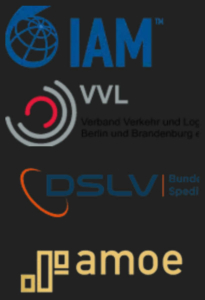Customs Regulations in Germany
Note: Please send copies of the following documents to the responsible office prior to shipment’s arrival at port:
Documents and Good-Standards*
Required Documents
- Passport (the page showing photo and personal information is sufficient)
- Registration form (“Anmeldebestaetigung”)
- This form must be obtained at the local registration office (“Einwohnermeldeamt”) in the city hall of the city you are moving to after your arrival in Germany. If you already have a registration and if it is older than 6 months, you need to obtain an “aktuelle Meldebescheinigung”.
- If the permanent address is not yet known, the registration form can be issued on a temporary address or e.g. hotel address.
- German nationals who did not de-register before they left Germany need to obtain an “aktuelle Meldebescheinigung” (not older than 6 months). Please note, that in this case tax and duty free importation cannot be guaranteed!
- EU citizens need a proof of residence overseas for the last 12 months before shipping, which can be obtained by one of the following ways:
- German Nationals can obtain a confirmation letter (“Umzugsbescheinigung”) from the German Consulate/Embassy abroad.
- A letter from the shipper’s employer abroad confirming that the shipper was an employee for the company abroad from MM/DD/YYYY to MM/DD/YYYY.
- Credit card settlements showing permanent transactions within the last 12 months.
- Purchase/vending of a residence or lease contract over the last 12 months.
- Tax returns of the last 2 years.
- Non-EU citizens need a letter from their employer in Germany confirming employment.
- Inventory in German or English (usually provided to us by the origin agent).
- Declaration form
Specific Information
- Household goods can be imported into Germany tax/duty free under the following conditions:
- Shipper has resided outside the EU for at least 12 months before shipping.
- The imported goods were owned by the shipper for at least 6 months before shipping.
- The goods are imported within 1 year of shipper taking up residence in Germany.
- Shipper can provide all documents required for Customs clearance.
- The imported goods will not be sold for a minimum of 1 year after importation.
- Otherwise import tax of 19% plus duty of apx. 10% apply on the good’s current value.
- Advance of taxes and duties will be subject to an extra charge of EUR 35.00.
Motorized Vehicles*
Required Documents
- Title
- Vehicle registration/s for a period of minimum 6 months prior to vehicle’s departure from overseas.
- Official vehicle de-registration form which clearly confirms de-registration of the vehicle in the origin country before its arrival in Germany. Only in case the vehicle registration expires exactly at the time of importing the vehicle into Germany, there is no need of a de-registration confirmation.
- Official vehicle de-registration form which clearly confirms de-registration of the vehicle in the origin country before its arrival in Germany. Only in case the vehicle registration expires exactly at the time of importing the vehicle into Germany, there is no need of a de-registration confirmation.
- To outlay the annual vehicle tax and to issue a vehicle tax card the responsible federal authority will bill an extra charge of approximately EUR 75.00.
- This time consuming process will most likely cause demurrage and detention and if applicable will be billed at cost.
- Official vehicle de-registration form which clearly confirms de-registration of the vehicle in the origin country before its arrival in Germany. Only in case the vehicle registration expires exactly at the time of importing the vehicle into Germany, there is no need of a de-registration confirmation.
- If available, also insurance policies for a period of minimum 6 months.
Specific Information
- Motor Vehicles can be imported into Germany tax/duty free under the following conditions:
- Shipper has resided abroad for at least 12 months before shipping
- Shipper has owned, titled, registered and used the vehicle for at least 6 months prior to vehicle’s departure from overseas and can provide the necessary proof (see below)
- The vehicle is imported within 1 year of shipper taking up residence in Germany
- The vehicle is brought in for personal use
- Shipper can provide all documents required for Customs clearance (see below)
- The imported vehicle will not be sold for a minimum of 1 year after importation
- Otherwise import tax of 19 % plus duty of apx. 10 % apply on the sum of the vehicle’s current value + shipping cost + insurance cost.
- Advance of taxes and duties will be subject to an extra charge of EUR 35.00.
- The fuel tank must be nearly empty, otherwise the vehicle cannot be accepted for transportation or the tank has to be drained at considerable cost.
- Please do not have your vehicle shipped before clarifying if all the required documents are available and conditions are met.
- After importation of motor vehicles:
- Vehicles have to be brought to European conformity. Cars require modifications and must be inspected before licensing and must comply with German technical/environmental regulations. Make sure the tires are street legal in Germany and in line with current speed rating requirements.
- On request it is recommend to consult a car conversion company to handle the complete conversion including all necessary paperwork, TÜV-inspection, issue German title, etc.
- For vehicles exported from the USA:
- You have to surrender your original title for the vehicle to U.S. Customs for export formalities, which will be returned to you after export clearance. However, you should obtain notarized copies of the title in your own interest. If the original title is not made available, exportation of your vehicle and household good shipment (if both are loaded together in same container) from the U.S. will be impossible. All charges arising in failure to provide original title along with the vehicle, and/or all charges due to orders by U.S. authorities (U.S. Customs inspection and related charges such as physical inspection, extra labour/efforts, port storage charges etc.) are payable prior to release of vehicle.
Pets
Required Documents
- be marked with a tattoo or a microchip. Pet animals newly marked since 3 July 2011 are required to have a microchip,
- have been properly vaccinated against rabies, and
- be accompanied with an official veterinary certificate (“Tier aus Nicht-EU-Staat”) stating the microchip number or the tattoo, as well as with vaccination documents and, if appropriate, the results of the blood test.
Specific Information
- Please remember that the documents of each pet animal (dog, cat, or ferret) entering from a non-EU state must always be inspected and its identity verified by the competent authorities.
- You should also bear in mind that you should be accompanied by no more than five animals. If you are accompanied by more animals, the EU trade conditions apply.
- If you enter accompanied by pets for which the conditions above have not been met, you must expect that at the first EU border the veterinary health officer will have the animals (at your expense in each case) either:
- returned to their land of origin,
- taken into quarantine for several months, or
- under certain circumstance, can order the killing of the animal
Restricted/Dutiable Items
- Items less than 6 months old (copy of invoice or value and date of purchase required)
- Alcohol (a detailed inventory is required with number and size of bottles, alc.%, and value of each bottle (a blank form is available from COMPAS))
- Other highly-taxes items (tobacco, tea, coffee, toilet waters, perfumes, etc.)
- Foodstuffs in large quantities
Notice: It is not recommended to ship these items. Inspections/delays/extra charges are likely. Advance of duties will be subject to an extra charge of EUR 35.00.
Prohibited Items
- Guns, paintball guns, rifles, etc.
- Explosives
- Ammunition
- Drugs and narcotics
- Live plants
- Any protected animal or species
- Dried plant or items of historical significance (ivory, snakeskin, leopard fur, pre-Colombian items, etc.)
- Pornographic material
- Absinthe
- Methyl alcohol and pure alcohol
- Radioactive material
- Large quantities of wine, grape juice and other various foodstuffs and consumer goods
Consignment Instructions
Recommended: Contact the destination agent to ensure all requirements for the customs regulations in Germany have been met prior to import, especially for differences regarding air/sea shipments.
Helpful Links:
Moving to Germany
Freight to Germany
Travel.State.Gov – Germany Country Info
https://de.usembassy.gov/
BAMF – Migration to Germany
Auswertiges Amt – Einreiseaufenthalt Deutschland
Cultural and Other Information:
CIA World Factbook Entry for Germany
Wikipedia Entry for Germany
The preceding data for the customs regulations in Germany is derived from the International Association of Movers (IAM). For more information visit the following website: http://www.iamovers.org/
* Depending on your personal situation, the following documents for the customs regulations in Germany may be relevant. For individual cases or specific information, [su_button url=”https://www.otc-global.com/en/the-firm/request-contact/” background=”#058DD8″ size=”1″ radius=”round” icon=”icon: envelope-open”]click here[/su_button] – we and our agents are at your disposal.
All specifications are without guarantee and based on our own research. We do not take any claim of completeness as well as correctness. We cannot guarantee that the content is updated and accurate and suggest to the concerned people that it is urgently required to obtain the current information from official authorities and involved service providers like customs agents in the respective importing countries before the individual removal project starts.


